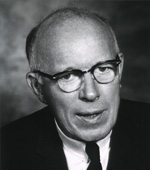Great Throughts Treasury
This site is dedicated to the memory of Dr. Alan William Smolowe who gave birth to the creation of this database.

René Dubos, fully René Jules Dubos
French-born American Microbiologist, Experimental Pathologist, Environmentalist, Humanist and winner of the Pulitzer Prize for General Non-Fiction, credited with maxim "Think Globally, act locally"
"Think globally, but act locally."
"Human diversity makes tolerance more than a virtue; it makes it a requirement for survival."
"Most of the dangerous aspects of technological civilization arise, not from its complexities, but from the fact that modern man has become more interested in the machines and industrial goods themselves than in their use to human ends."
"Civilizations commonly die from the excessive development of certain characteristics which had at first contributed to their success."
"Eradication of microbial disease is a will-o'-the-wisp; pursuing it leads into a morass of hazy biological concepts and half-truths."
"Human destiny is bound to remain a gamble, because at some unpredictable time and in some unforeseeable manner nature will strike back."
"It is not man the ecological crisis threatens to destroy but the quality of human life."
"It is often by a trivial, even an anecdotal decision, that we direct our activities into a certain channel, and thus determine which of the potential expressions of our individuality become manifest. Usually we know nothing of the ultimate orientation or of the outlet toward which we travel, and the stream sweeps us to a formula of life from which there is no returning. Every decision is like a murder, and our march forward is over the stillborn bodies of all our possible selves that will never be."
"Man not only survives and functions in his environment, he shapes it and he is shaped by it."
"Man shapes himself through decisions that shape his environment."
"Man will survive as a species for one reason: He can adapt to the destructive effects of our power-intoxicated technology and of our ungoverned population growth, to the dirt, pollution and noise of a New York or Tokyo. And that is the tragedy. It is not man the ecological crisis threatens to destroy but the quality of human life."
"Nature always strikes back. It takes all the running we can do to remain in the same place."
"Neither wealth nor knowledge can provide effective ways to deal with human excesses."
"More can be learned from what works than from what fails."
"Religion and science ... constitute deep-rooted and ancient efforts to find richer experience and deeper meaning than are found in the ordinary biological and social satisfactions. As pointed out by Whitehead, religion and science have similar origins and are evolving toward similar goals. Both started from crude observations and fanciful concepts, meaningful only within a narrow range of conditions for the people who formulated them of their limited tribal experience. But progressively, continuously, and almost simultaneously, religious and scientific concepts are ridding themselves of their coarse and local components, reaching higher and higher levels of abstraction and purity. Both the myths of religion and the laws of science, it is now becoming apparent, are not so much descriptions of facts as symbolic expressions of cosmic truths."
"Now and then in my dreams, I see a place where one might initiate and publicize programs to give the environmental movement a positive constructive philosophy that would complement the present defensive attitude of environmental conservation and protections."
"The belief that we can manage the Earth and improve on Nature is probably the ultimate expression of human conceit, but it has deep roots in the past and is almost universal."
"Reverence for nature is compatible with willingness to accept responsibility for a creative stewardship of the earth."
"The most important pathological effects of pollution are extremely delayed and indirect."
"The progress of science depends less than is usually believed on the efforts and performance of the individual genius ... many important discoveries have been made by men of ordinary talents, simply because chance had made them, at the proper time and in the proper place and circumstances, recipients of a body of doctrines, facts and techniques that rendered almost inevitable the recognition of an important phenomenon. It is surprising that some historian has not taken malicious pleasure in writing an anthology of 'one discovery' scientists. Many exciting facts have been discovered as a result of loose thinking and unimaginative experimentation, and described in wrappings of empty words. One great discovery does not betoken a great scientist; science now and then selects insignificant standard bearers to display its banners."
"There is a demon in technology. It was put there by man and man will have to exorcise it before technological civilization can achieve the eighteenth-century ideal of humane civilized life. Man shapes himself through decisions that shape his environment."
"The word wilderness occurs approximately three hundred times in the Bible, and all its meanings are derogatory."
"To accept as a fact of life that a certain technology will be used for the simple reason that we know how to use it, or that we shall continue to live under a certain social system after it has become too complicated for human understanding, is tantamount to an abdication of intellectual and social responsibility."
"Whereas the child is chiefly playful and experimental, the adult focuses on specific and conscious experiences. He practices selective inattention to the objects for which he has no immediate use and develops a kind of tunnel vision that helps him to move toward selected goals. This focusing on a limited range of experiences and goals is largely responsible for one's individual evolution and gives a deep and almost tragic significance to a statement made by Albert Camus in his novel La Chute: Apr"